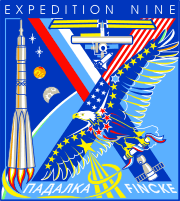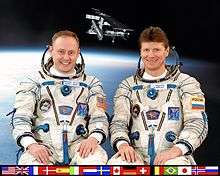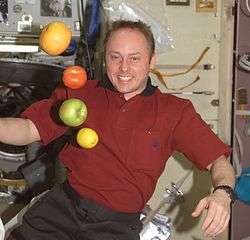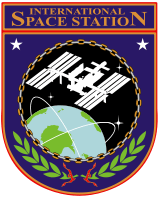Expedition 9
Expedition 9 (2004) was the ninth expedition to the International Space Station (21 April 2004 - 23 October 2004).
| Mission type | ISS Expedition |
|---|---|
| Mission duration | 185 days, 15 hours, 7 minutes (at ISS) 187 days, 21 hours, 16 minutes (launch to landing) |
| Distance travelled | ~121,802,083 kilometres (75,684,306 mi) |
| Orbits completed | 2,940 |
| Expedition | |
| Space Station | International Space Station |
| Began | 21 April 2004, 05:01 UTC |
| Ended | 23 October 2004, 20:08 UTC |
| Arrived aboard | Soyuz TMA-4 |
| Departed aboard | Soyuz TMA-4 |
| Crew | |
| Crew size | 2 |
| Members | Gennady I. Padalka E. Michael Fincke |
| EVAs | 4 |
| EVA duration | 15 hours, 45 minutes |
  L-R: Edward Fincke and Gennady Padalka | |
Crew
| Position | Astronaut | |
|---|---|---|
| Commander | Gennady Padalka, RSA Second spaceflight | |
| Flight Engineer 1 | Michael Fincke, NASA First spaceflight | |
Backup Crew
| Position | Astronaut | |
|---|---|---|
| Commander | Leroy Chiao, NASA Fourth spaceflight spaceflight | |
| Flight Engineer 1 | Salizhan Sharipov, RSA Second spaceflight spaceflight | |
Original Crew
| Position | Astronaut | |
|---|---|---|
| Commander | Gennady Padalka, RSA Second spaceflight | |
| Flight Engineer 1 | Michael Fincke, NASA First spaceflight | |
| Flight Engineer 2 | Oleg Kononenko, RSA First spaceflight | |
Mission parameters
- Perigee: 384 km
- Apogee: 396 km
- Inclination: 51.6°
- Period: 92 min

Mission objectives
Padalka and Fincke arrived at the Station on 21 April 2004 aboard the Soyuz TMA-4 spacecraft with European Space Agency (ESA) Astronaut André Kuipers. After more than a week of joint operations and handover activities, Padalka and Fincke officially took command of the Station on 29 April when Expedition 8 Commander Michael Foale and Flight Engineer Alexander Kaleri left the Station. This mission was the site for the Advanced Diagnostic Ultrasound in Microgravity Project.
Expedition 8 and Kuipers returned to Earth that same day aboard the Soyuz TMA-3 spacecraft. Kuipers' 11-day mission to the ISS was part of a commercial agreement between ESA and the Federal Space Agency of Russia.
Spacewalks
The Expedition 9 crew conducted four spacewalks during its stay at the International Space Station. The four spacewalks were devoted to ISS maintenance and assembly. All four were based out of the Pirs Docking Compartment and used Russian Orlan spacesuits.
Before these four extravehicular activities (EVAs), 52 spacewalks had been performed at the ISS, with 27 based out of the Station.
Gennady Padalka (EV1): red stripes Mike Fincke (EV2): blue stripes
Spacewalk 1 Gennady Padalka, Mike Fincke Time: 14 minutes, 22 seconds Start time: 4:56 p.m. CDT (2156 GMT) 24 June 2004 End time: 5:10 p.m. CDT (2210 GMT) 24 June 2004
The spacewalk was cut short due to a pressure problem in Fincke's prime oxygen tank in his spacesuit. Mission managers decided to reschedule the spacewalk for 30 June.
Spacewalk 2 Gennady Padalka, Mike Fincke Time: 5 hours, 40 minutes Start time: 4:19 p.m. CDT (2119 GMT) 29 June 2004 End time: 9:59 p.m. CDT 29 June 2004 (0259 GMT 30 June 2004)
Padalka and Fincke replaced a Remote Power Controller (RPCM) that failed in late April, causing a loss of power in Control Moment Gyroscope No. 2 (CMG 2). A failed Remote Power Controller Module was responsible for the temporary loss of CMG 2 in April. The gyroscope is one of four that control the ISS' orientation.
Spacewalk 3 Gennady Padalka, Mike Fincke Time: 4 hours, 30 minutes Start time: 1:58 a.m. CDT (0658 GMT) 3 August 2004 End time: 6:28 a.m. CDT (1128 GMT) 3 August 2004
In preparation for the arrival of the European Space Agency's Automated Transfer Vehicle (ATV), Padalka and Fincke removed laser retro reflectors from the Zvezda Service Module assembly compartment and installed three updated laser retro reflectors and one internal videometer target. They installed two antennas.
The spacewalkers removed Kromka Panel No. 2 and installed Kromka Panel No. 3. The Kromka experiment exposes various materials to the space environment. They also replaced another materials science experiment.
Spacewalk 4 Gennady Padalka, Mike Fincke Time: 5 hours, 20 minutes Start time: 16:43 UTC, 3 September 2004 End time: 22:04 UTC, 3 September 2004
Expedition 9's fourth scheduled EVA prepared the Station for future assembly operations and the arrival of the ATV. The spacewalkers replaced the Zarya Control Module flow control panel and installed four safety tether fairleads on Zarya's handrails.
ATV support operations included installing equipment for the air-to-air radio link antennas and removing all covers from antennas.
Other tasks included installing a Pressure Control and Exposure Monitor Sensor on Pirs and installing protective components on the brackets of Pirs' ring handrails on EVA Hatch No. 2.
Mission patch
The design of the Expedition 9 mission patch includes a tribute to astronauts and cosmonauts who gave their lives in space exploration. The outspread wings of the eagle have 16 stars and 1 star of David. They represent the Apollo 1 crew Gus Grissom, Ed White and Roger Chaffee. Space Shuttle Challenger STS-51L crew Dick Scobee, Michael J. Smith, Ronald McNair, Ellison Onizuka, Gregory Jarvis, Judith Resnik and Christa McAuliffe. Space Shuttle Columbia STS-107 crew Rick Husband, William C. McCool, David M. Brown, Kalpana Chawla, Michael P. Anderson, Laurel Clark and Ilan Ramon, the first Israeli astronaut. Around the eagles neck are 4 small red stars and one larger red star. The large star is for Yuri Gagarin, the first man in space during Vostok 1, who was killed during training for Soyuz 3. The other 4 are for Soyuz 1 cosmonaut Vladimir Komarov, Soyuz 11 crew Georgi Dobrovolski, Viktor Patsayev and Vladislav Volkov.
References
![]()
